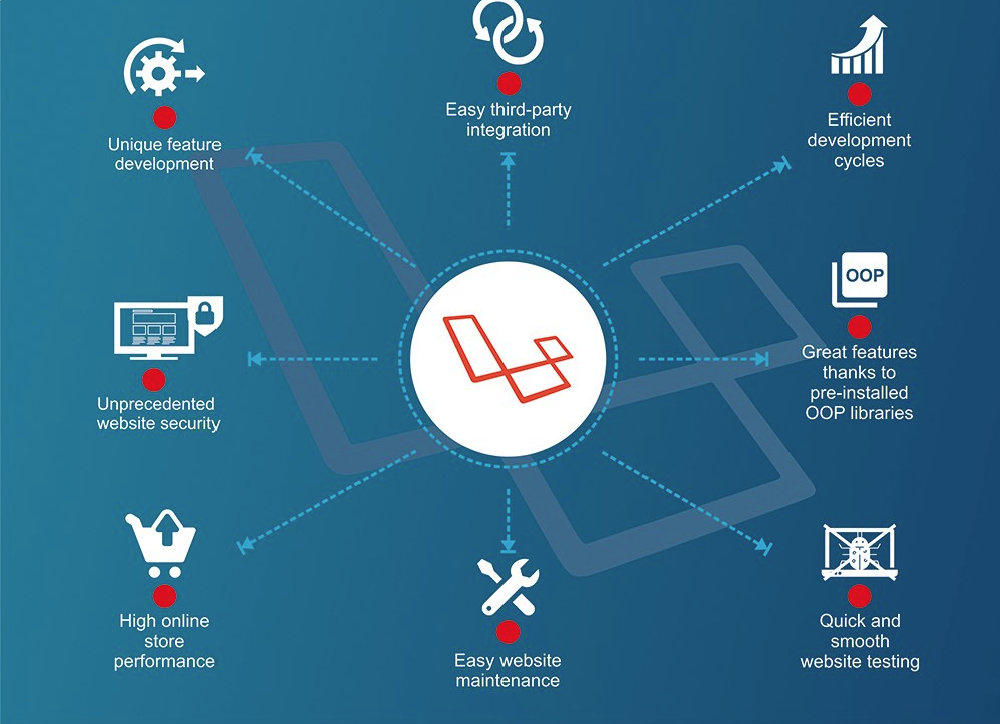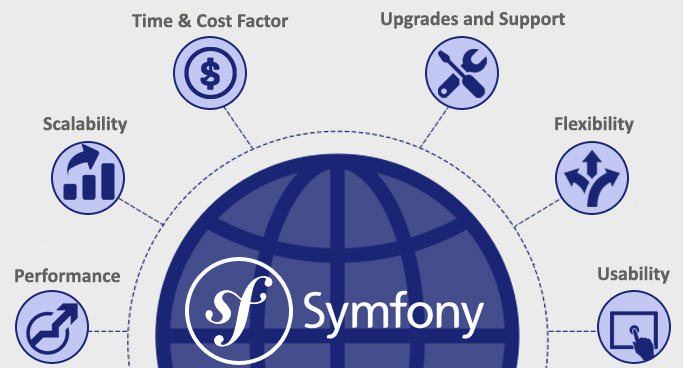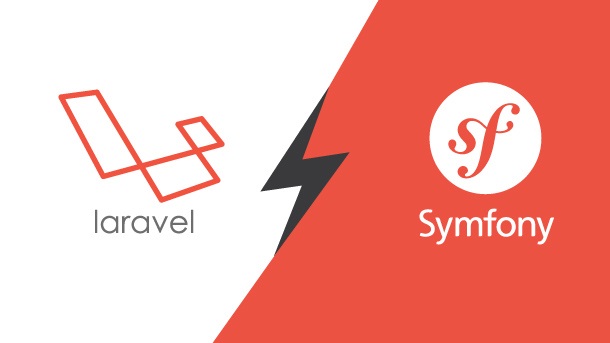When it comes to starting a new project, one of the important decisions you make is picking the right framework. It is nearly impossible to imagine developing a complex web application from scratch without choosing one. Developers and business owners are constantly looking for solutions that enable the quality and fast development of apps. To achieve so, the majority of them prefer to go with PHP frameworks.
Today, the web development industry is overcrowded by a number of languages having their default framework. However, PHP has no default framework and offers a lot of options for web development.
Out of all, Symfony and Laravel emerged as one of the most popular platforms for building enterprise applications. Making a choice between these two could be difficult, as both have their own pros and cons which should you know in order to understand what framework would match your requirements the best.
In this post, we will compare both these frameworks based on different aspects, so you can choose along the way what is right for your business and products.
Introduction to Symfony
Symfony is an enterprise-grade application development framework that was launched in 2011. What makes Symfony a powerful web development tool is the sets of reusable and decoupled components, libraries and packages, which are used to build key PHP applications.
Symfony is highly influenced by the Spring framework which is based on open-source technology and utilizes Doctrine as layers for object-relational mapping, Twigas template engine, PHPUnit as a testing framework and so on. Over the years, Symfony has evolved into a more reliable and mature platform for creating high-end applications.
Introduction to Laravel
Laravel is an open-source web framework, which is designed for MVC web applications. The platform reuses existing components of multiple platforms to create web applications. It offers plenty of tools for HTML templating, MVC applications, database interaction, routing, testing and much more.
If you have good knowledge of advanced PHP and core PHP, Laravel will appear much easier. It is well-known as a simple coding and time-saving framework, which is ideal for developing simple as well as complex web applications.
Similarities between Symfony and Laravel
Both Symfony and Laravel shares some similarities as they are based on the same programming language – PHP. Both are multi computing platforms, making them cross-platform in nature, which speeds up the development process.
They have multi-language content and offer multi-user support. Both frameworks have common attributes, such as scaffolding of the application, a pattern for interfaces and support text search. Implementing the best practices for web development using any of these two platforms will lead to a perfect application.
Symfony Vs. Laravel: Which is best for you?
It is pretty easy to spot differences between these two frameworks based on certain features. Once distinguished, a couple of questions start to emerge, and when you answer these questions, the best framework for your specific project will distinguish itself.
#1 Performance

The performance of a web application works like a backbone. Based on a study conducted by Mobile app daily, a Laravel site takes around 60 milliseconds to load, while a Symfony site takes around 250milliseconds to load. That is because Laravel uses a series of unified APIs for caching views, while Symfony caches views and source code. This significantly impacts the page loading speed.
However, with new improvements and upgrades in Symfony, its performance is on a par with Laravel. As long as, you are using the latest versions of both the frameworks, performance is a toss-up, and hence there is no change in the score.
#2 Popularity
The popularity of a framework is based on several aspects. The number of apps built, level of support, cost-efficiency, time-saving, developers’ preference and so on. Although you shouldn’t consider popularity alone to choose a framework, there are some good benefits that popularity brings. With popularity, there comes a large amount of support and training online.
Laravel offers a plethora of information through Laracasts, which Symfony doesn’t provide currently. Symfony offers great documentation, but the resources are not as vast as Laravel. Laravel is the most popular PHP framework that is used to power over a million websites, which is significantly higher compared to 33,000 websites powered by Symfony.
#3 Development Time and Cost
The lesser code and better performance of Laravel enable web developers to build applications quickly and easily. Hence, if you are thinking of developing your next enterprise application, then Laravel can be a good choice as it requires fewer resources.
On the other hand, Symfony needs large resources and more coding efforts than Laravel to develop high-end applications. However, the ability to reuse components and libraries in Symfony reduce time and development cost significantly. Thus, Symfony’s functionalities work well with any business application requirements.

#4 Template Engine
Though, PHP itself is a templating engine, it further provides an additional templating engine that offers more advanced templating with less syntax. Symfony uses the Twig templating engine that allows you to write concise and readable templates, while Laravel uses the blade templating engine that allows code reusability, which doesn’t exist inTwig.
Due to this feature, Blade provides advantages over Twig and allows developers to deploy the same code multiple times rather than defining the same functions again and again. In addition, Laravel introduces Lumen, a sub-framework for creating APIs and microservices.
Utilizing other template engines allow you to keep the business logic in the PHP, while presentation logic within the templating engine. Both templating engines have two main features: blocks or sections and template inheritance. These features enable you to define a basic template with override blocks and child templates that input values of those blocks.
#5 Database Support and Migration
Database support is an important factor to consider as it enables developers to manage data and carry out multiple tasks efficiently. To work with databases, both frameworks offer Object-RelationalMapping or ORM that makes storing, organizing and accessing the data easier.
Symfony utilizes third-party library doctrine that handles ORM and provides out-of-the-box support for Drizzle, MySQL, SQLite, SQLServer, Oracle and many more. On the other hand, Laravel uses its own library Eloquent for handling ORM that provides out-of-the-box support for MySQL, PostgreSQL, SQLServer and SQLite. As you see Symfony supports more databases compared to Laravel.
Database migration in Symfony is automatic. However, developers need to define particular fields in the given code. Database migration in Laravel is manual, but developers don’t need to define the fields.
#6 Modularity and Scaling
Although Symfony and Laravel are based on MVC architecture, Symfony wins over Laravel when it comes to code modularity and component reusability. Symfony manages the code in a cleaner and more efficient way, making it a perfect fit for more complex and larger projects.
Symfony comes with several bundles, such as Security Bundle, Framework Bundle and Debug Bundle, which enable sharing code and components between different applications. That is the reason developers favor Symfony over Laravel.
Laravel’s strength revolves around MVC infrastructure, which means if you wish to think anything outside the MVC paradigm, Laravel cannot help you. Moreover, it restricts at certain points when you want to make changes in your application. Often developers have to change the entire unit of code rather than changing code only in the module.
Using pre-built dependencies in Laravel will help you build and start running the application quickly. But, when you are creating complex applications, choosing your plugins and dependencies will make app development easier to scale and enhance. For this reason, Laravel can not win over Symfony for its modularity and flexibility.
#7 Documentation and Learning Curve
When it comes to documentation and materials, Symfony has no match compared to Laravel. The support videos and tutorials offered by Laravel cover each and everything. Moreover, the amount of materials available at Laravel Github docs is endless. Although Symfony documentation is not as good as Laravel, it does provide materials explaining bundles, components, libraries and more.
Most developers have stated that the learning curve of Symfony is a little steeper than Laravel. Working with Laravel feels more intuitive and it is extensively used for creating the back-end part of the project. Not to forget to mention, Symfony has a huge community of developers around the globe to help you identify bugs and fix them.
When to Choose Symfony?

Symfony is an ideal choice when you want to work efficiently and quickly. Since it is well-structured, scalable and maintainable, it is extensively used to create complex and large-size enterprise applications. Symfony also offers huge community support.
When to Choose Laravel?
If you are new to the web application world, Laravel may be right as it is easy to learn, offers better learning materials and has a simpler syntax. It facilitates rapid application development and helps you create high performing applications. Moreover, it is easy to find Laravel developers.
The Bottom Line
Symfony and Laravel both are excellent choices for robust and rapid app development, and hence, there is no clear winner. Picking the right framework ultimately depends on your end goals. It is suggested that you consult PHP experts to know which platform will suit your requirements the best and which framework they are most comfortable working with.
Being one of the leading web development companies, Velox Softech has a team of Symfony developers who have a proven record of offering excellent solutions that meet your business needs.



